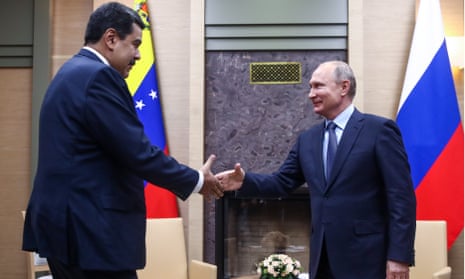Vladimir Putin has voiced support for the Venezuelan leader, Nicolás Maduro, as he visited Moscow seeking financial assistance for the socialist country’s collapsing economy.
At a meeting at Putin’s residence outside Moscow, the Russian president told Maduro: “We support your efforts to achieve mutual understanding in society and all your actions aimed at normalising relations with the opposition.”
Putin added: “Naturally we condemn any actions that are clearly terrorist in nature, any attempts to change the situation by force.”
Hit by low oil prices, mismanagement and the impact of US sanctions, Venezuela is in freefall and Maduro is seeking support from allies after winning a second presidential term this year.
Quick GuideWhy is Venezuela in crisis?
Show
Under the late Hugo Chávez, who ushered in Venezuela’s socialist revolution in 1999, a new constitution and numerous elections placed nearly all government institutions under the control of the ruling Socialist party.
This concentration of power was aided by a feuding opposition which carried out ineffectual campaigns and electoral boycotts. After Chávez died of cancer in 2013, he was succeeded by Nicolás Maduro who is even less tolerant of dissent.
Growing political authoritarianism has coincided with greater state dominance over the economy. But expropriations, price controls and mismanagement have led to a 40% contraction of the economy in the past five years.
Oil accounts for 96% of Venezuela’s export income but many foreign companies have been driven out and production has dropped to a 30-year low.
The resulting fiscal crisis has prompted the government to print more money, which has led to hyperinflation and a collapse of the currency.
It also means that the government can’t import enough food and medicine to meet demand.
Maduro has rejected economic reforms out of loyalty to socialism and because many government officials are allegedly getting rich off the economic distortions – through exchange rate scams and by selling scarce food on the black market.
Maduro, who took over following the death of Hugo Chávez in 2013, has come under strong pressure from Donald Trump’s administration, which calls him a “dictator”.
While he won the May elections, most of the international community did not recognise the results. Formally, Maduro’s second mandate only begins in January next year.
Maduro told Putin he was sure their talks would bring “good news for cooperation between our countries and for the economies of our countries”.
Putin’s spokesman, Dmitry Peskov, said ahead of the meeting that Maduro had travelled to Moscow specifically to ask Russia – itself the target of US sanctions – for financial assistance.
“The talks will focus on the help that the Venezuelan leadership needs,” Peskov told reporters, declining to be more specific on how much Russia could lend.
He said the economic situation in the Latin American country remained difficult but noted “signs of improving dynamics”.
Venezuela, which has been rocked by deadly protests and economic chaos, is counting on Russian support amid growing international isolation.
Food and medicine shortages have sparked an exodus of some 2 million people. The International Monetary Fund projects hyperinflation of 10m% next year.
After talks last year between Maduro and Putin, Russia, Venezuela’s major creditor, agreed to restructure $3.15bn of debt from a loan taken out by Caracas in 2011 to finance the purchase of Russian arms.
Largely isolated from the international community, Maduro is now trying to shore up support from his allies.
He was visiting Moscow after hosting his Turkish counterpart, Recep Tayyip Erdoğan, in Caracas.
Russia and Venezuela enjoy a long history of ties and Chávez, known for his passionate tirades against the United States, was a welcome guest at the Kremlin.
